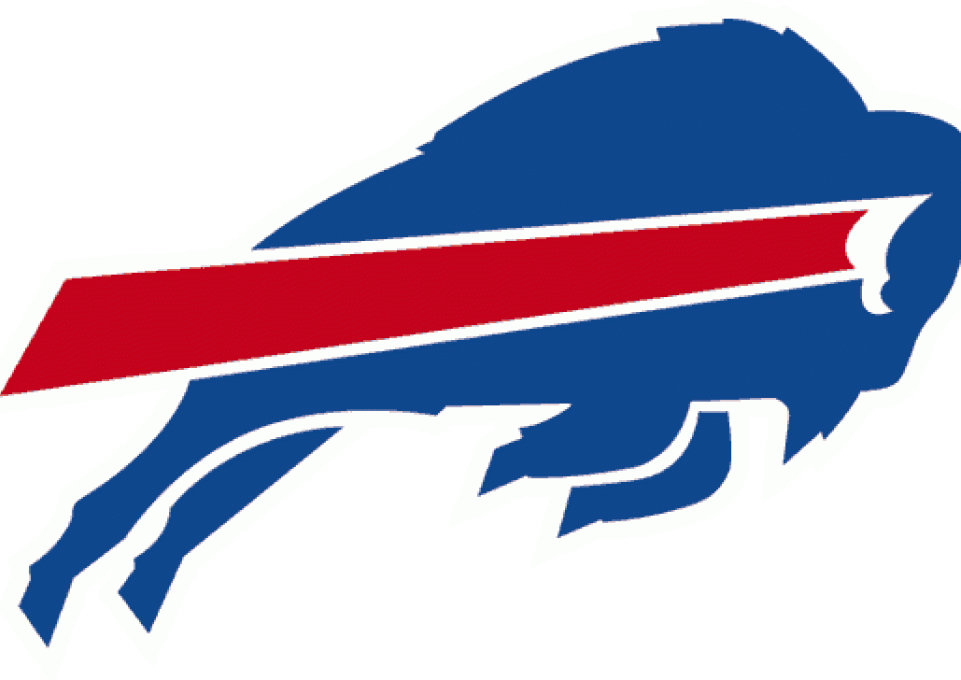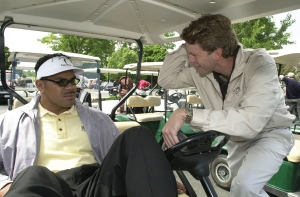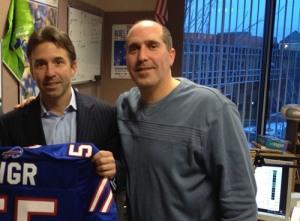
When the Buffalo Bills kick off their 2012 season this Sunday against the New York Jets, who will fans turn to for the hardest-hitting football news and commentary? Buffalo State graduates, of course.
At the Buffalo News, veteran beat writer Mark Gaughan, '83 (top photo, pictured at right), covers the squad with a critical eye. (He also serves as president of the 300-member Pro Football Writers of America.) And at WGR 550 AM, the new flagship radio home of the Bills, morning-drive host Howard Simon, '84 (center photo, pictured at right), and afternoon-drive host Chris "Bulldog" Parker, '94 (bottom photo, pictured at left), along with afternoon-drive producer Greg Bauch, '99 (bottom photo, pictured at right), lead daily discussions about the hometown team.
Recently, Gaughan, Simon, Parker, and Bauch took time to talk about the importance of the Bills to our community, the fun they have covering the team, and the career preparation they received right here at Buffalo State.
What do the Bills mean to Western New York?
 Gaughan: There’s no question that the Bills are the single most unifying institution in Western New York—and there’s no question that people across the country love the NFL as a pastime. There are many, many wonderful places to live in this country, but only 32 cities have a NFL team. That’s special. And there’s no doubt that because Buffalo is a small market city with just one other major-league level team, a lot of attention is focused on the Bills.
Gaughan: There’s no question that the Bills are the single most unifying institution in Western New York—and there’s no question that people across the country love the NFL as a pastime. There are many, many wonderful places to live in this country, but only 32 cities have a NFL team. That’s special. And there’s no doubt that because Buffalo is a small market city with just one other major-league level team, a lot of attention is focused on the Bills.
Simon: The entire community bonds over the Bills. And I mean everybody, not just the devoted sports fan. When the Bills get on a run, it’s magical. Even last year, just a few wins at the start of the season got people excited and wearing the colors around town. The Bills really are an institution that a lot of people care about.
WGR is back as the flagship home of the Bills. How happy are you about that?
 Simon: It’s pretty exciting to be the flagship for both the Bills and Sabres. We had a good program without having the Bills games, but having the games makes things even better. It’s a lot of work, but it’s a lot of fun. When you’re the flagship, everyone is tuned in and listening. The last time WGR had the game rights, the Bills went to four straight Super Bowls—I’m just saying.
Simon: It’s pretty exciting to be the flagship for both the Bills and Sabres. We had a good program without having the Bills games, but having the games makes things even better. It’s a lot of work, but it’s a lot of fun. When you’re the flagship, everyone is tuned in and listening. The last time WGR had the game rights, the Bills went to four straight Super Bowls—I’m just saying.
Parker: The expectation is that the audience will be bigger, especially on game day. That’s a great thing and we know that there’s a responsibility that comes with that.
What do you like best about your job?
Gaughan: Everyone has a story. That’s why it’s very enjoyable to write for a newspaper. And when you’re writing about a football team with 53 players and 18 coaches, there are a lot of stories and a lot of perspectives to cover.
Simon: It comes down to this: I love sports and I love the fact that listening to sports talk on the radio is like listening to your buddies talk sports down at the neighborhood bar. Radio has an instantaneous reach. You say something and people immediately react by calling or texting in. I also like that you’re talking with a lot of listeners in the general audience, but that you can also have one-on-one conversations with fans, players, and coaches. I’m lucky enough that I get to do that for a living.
 Parker: Buffalo sports fans can get really frustrated and they often turn to us to let that go. But to me, sports is supposed to be fun. It is fun! That’s why we try to do interesting shows and be creative. A lot of our show, we just let it happen. It’s pretty organic. It’s fun to be involved in that kind of conversation.
Parker: Buffalo sports fans can get really frustrated and they often turn to us to let that go. But to me, sports is supposed to be fun. It is fun! That’s why we try to do interesting shows and be creative. A lot of our show, we just let it happen. It’s pretty organic. It’s fun to be involved in that kind of conversation.
Bauch: A lot of people figure, if you have a complaint about the local sports team, pick up a phone—and we take their calls for free! It’s good to be the go-to guys. Conversely, when the Bills or Sabres go on a playoff run, or even win a few games in a row, there is this swell of emotion around town and we come into work floating on air. It’s like being in charge of the big bonfire.
How has the digital age changed your roles in the media?
Gaughan: Technology changes every industry over time. The result for the newspaper industry has been more competition on a day-to-day basis. That keeps everyone on their toes. I’m fine with it. It’s fun to interact with readers more online. My workload is greater than ever. In the late 1990s, I had about 300 bylines per year. Now, I have 600 a year.
Bauch: Technology is changing the industry. With Twitter and blogs, there’s an expectation of immediate reaction to everything. That forces us, as a news outlet, to comment on things that are nonsense. The Bills are not for sale, yet every time a rumor spreads about a potential sale, we have to take time to confirm that what we already knew: they’re not for sale!
How did your time at Buffalo State prepare you for your career?
Gaughan: I worked for the Record all four years and was the editor in chief my senior year. It was a great experience. Actually, I’d say it was the best thing about my college experience. It can’t be overstated how much of a benefit working on the Record was to me. The only way to become a better writer is to write, and the Record allowed me to practice my craft as a reporter while being guided by great advisers like Bud Wacker and Charlie Adair.
Simon: I had such a fantastic experience at Buffalo State. I remember going down to the radio station my freshman year and really being impressed with the operation. I got on the air right away and was the sports director by my sophomore year. I did sportscasts, sports talk shows, and play-by-play. The hands-on experience was invaluable. I also met a lot of great people there. Tom McCray was and still is a big influence. He was the WBNY station adviser when I was at Buff State and I took some of his studio classes. He has a brilliant mind for radio. Buffalo State really set me up for my entire professional life. I know that (Syracuse University’s) Newhouse School has the reputation, but for my money no one does communications better in New York State than Buff State.
Parker: My time at WBNY was vital. College radio was really in its prime in the 1990s and I remember that the radio board was contemplating getting rid of sports and filling that time with music. Now I’m a music fan, but as the sports director, I fought against that. I had a show on All-Talk Mondays. We’d bring in a bunch of friends and talk sports, which, as it turns out, was excellent training for my job today. Mel Netzhammer, Tom McCray, Penny Williams—they all had a big influence on me.
Bauch: I remember going to visit Alfred University to check out their ceramic engineering program and on the drive back home thinking, “I hate math. I don’t want to do this.” And then I read the Buffalo State viewbook and saw the word broadcasting and was really intrigued by that. As soon as I got involved with the radio station, I was doing play-by-play for football, hockey, and basketball games. I’d keep the tapes and listen to how I did and think about what I could do better. (Head football coach) Jerry Boyes was always great for a boost. Every time I asked him a question after a game, he would say, “Great question, Greg.” It helped at the time to have that soft landing. And I learned a lot from Tom McCray. Buffalo State is really fortunate to have Tom.
